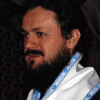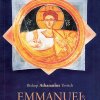Art and Reality: Serbian Perspectives
Friday, May 1, 2015, 6:00 pm
Marshall D. Shulman Seminar Room (1219 IAB, 420 W 118th St.)
Please join the East Central European Center and the Harriman Institute for a talk by Svetlana Rakić.
Rakić will present some of the most recent trends in Serbian two-dimensional art. Selected examples testify to the diversity, vibrancy, and beauty of art produced in this troubled country during the turbulent past two decades. Having witnessed their former country, Yugoslavia, torn apart by civil war, and their ‘new’ country, Serbia, crippled by NATO bombings, political intrigues, corruption, staggering unemployment, and bleak prospects for recovery, these artists have turned to the creative potential of the human imagination to escape, confront, and comment on a situation over which they have no control. Despite the specificity of the conditions under which Serbian artists live and work, their works of art – poignant, inspiring, humorous, or despairing – touch a responsive chord in the viewer that attests to their success at achieving an expression that is both universal and human.
.Svetlana Rakić was born in Sarajevo (now Bosnia-Herzegovina) in 1958. She left her home country, Yugoslavia, in 1992 to come to the U.S. She received her M.A. in art history from the University of Belgrade, Serbia, in 1989 and her Ph.D. in art history from Indiana University, Bloomington in 1999. She teaches art and art history as a full professor at Franklin College, Indiana. Rakić is the author of two books on icons from Bosnia-Herzegovina, a book on the twentieth-century American painter Alexander Markovich, and numerous articles published in academic journals in Yugoslavia, Serbia, and the United States. Before coming to the U.S., Rakić worked as a curator at the State Art Gallery of Bosnia-Herzegovina in Sarajevo and as a consultant at the Institute for Preservation of Cultural Heritage of Bosnia-Herzegovina in Sarajevo. In addition to her interest in pre-modern and modern Western art, Rakić is a painter and has exhibited her works in the U.S., Germany, and Serbia.
Sponsored by the Njegos Endowment for Serbian Language and Culture.




